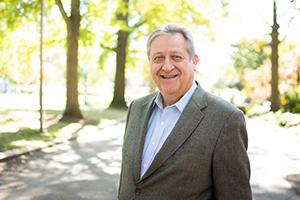Business
Testifying for the Future Kogod Professor Donald Williamson testified before the IRS to help shape tax policies to better benefit average Americans.

When it comes to filing taxes, it can be challenging to know where to begin and the appropriate steps to take — especially when there are unclear tax policies in place. But for Donald Williamson, Kogod Eminent Professor of Taxation and director of the graduate tax program at American University’s Kogod School of Business, navigating this challenge is his passion.
With the Internal Revenue Code as his guide, Williamson is using his 30 years of experience to help mold the future of tax policy. On October 16, 2018, Williamson testified before the Internal Revenue Service (IRS) on the Qualified Business Income Deduction. His position? To amend the regulation with a sentence that clarifies income from rental properties is sufficiently trade or business — qualifying it for the deduction.
“It's a rule that shows a policy of wanting to level the playing field between corporations and sole proprietorships and partnerships,” he explained. “It reflects a policy of wanting to have a level playing field.”
Essentially, the Qualified Business Income Deduction is an income tax deduction for individuals who make under $157,500 or $315,000 on a joint income tax return, who can then deduct 20 percent of the net profit that they earn from a sole proprietorship or their share of partnership or S-corporation earnings.
What Williamson testified for specifically is what he calls a “safe harbor,” which is aimed at average Americans engaged in real estate rental activities. This amendment, he stated in his testimony, is neither unprecedented nor unusual for provisions aimed at middle income Americans investing directly in real estate.
The impact of Williamson’s testimony could create meaningful change in the business world and those who inhabit it. If the Qualified Business Income Deduction is amended, it would leave more money in the pockets of income earners. As with anything, however, there are drawbacks.
“Like every deduction in the entire Act, we went into debt by another $1.5 trillion,” he said. “I may not have to pay in my lifetime, but maybe you might. Because the day of reckoning is coming — it is coming. At some point, we're not going to be able to loan money.”
Despite the challenges of navigating tax policies, Williamson has been busy promoting change and spreading actionable information.
Just this year, he co-authored an article that shines a light on tax credit opportunities for startups. And he is currently working on an article for Bloomberg that explains the choice of entity. He also co-published a report in response to the Tax Cuts and Jobs Act. In the report, Williamson and his co-authors lay out how the new law significantly shifts the payment of salary to dividends and the impact it will have, specifically on IRS audit and collection activities.
In his three decades of working closely with students, faculty, and clients, he’s learned the importance of fighting for policies that benefit working Americans. And his role as the executive director of the Kogod Tax Policy Center, aligns with those efforts. The goal of the center focuses on increasing understanding of the nation’s tax law, focusing on the challenges of tax compliance, and planning for average Americans and their small businesses — elements he drew into his testimony before the IRS.
Over the years, Williamson has heard clients express that they feel like they’re working just to be able to pay him to do their taxes.
“That's terrible,” he said. “Where people like me make more money than people adding value to the economy. There's something wrong with that.”
But Williamson, with the force of Kogod behind him, may be able to change the tides and make a difference that will be felt in the business sphere.
“We’re changing the law,” Williamson said. “We are lighting a candle in the darkness."
